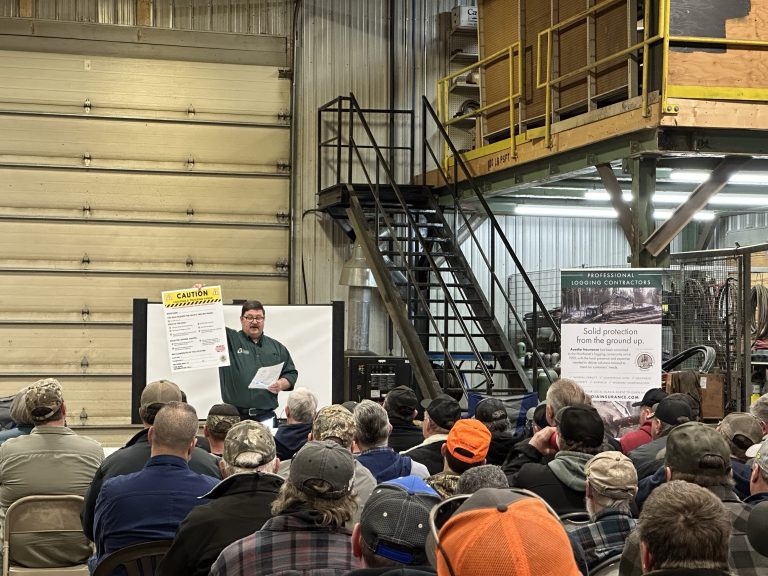Maine Pulp and Paper Association Summit
BANGOR – It is no secret to professional loggers that Maine’s pulp and paper industry is in crisis right now – next to paper mill workers themselves, loggers and their families are hit harder than any other sector of the state economy when mills shut down or slow down.
That was part of the message delivered by the Professional Logging Contractors (PLC) of Maine to more than 200 pulp and paper industry representatives, legislators, forest products experts, loggers, and members of the media attending the Maine Pulp and Paper Association (MPPA) summit on the future of the industry Nov. 17.
While the focus of the event was on the challenges facing the pulp and paper industry, the PLC ensured the concerns of loggers were heard and that loggers – often perceived as part of the problem – were instead viewed properly as critical to the solution.
Speakers including PLC Executive Director Dana Doran and logger Thomas Douglass, head of operations for R.A. Thomas Logging and Forestry of Guilford, outlined the realities of the logging industry today.
“It’s not a good situation out there right now – in the last four months I’ve heard from six of our members that they’re going out of business,” Doran said. “My prediction right now is that by the mud season of 2016 we’re going to see a reduction probably of 10 to 15 percent in total logging capacity in the state of Maine. That is a tough story to tell but it’s the reality of the situation.”
Loggers are being hit by a perfect storm of challenges right now: Fewer active pulp and paper mills and mills idling paper machines due to lowered demand for many paper products is reducing demand for wood fiber from Maine loggers. Low natural gas prices are cutting deeply into demand for biomass. Costs of operating a modern logging business are rising. Qualified workers are in short supply. Changes in land ownership and legislation are creating uncertainty in the logging market.
One common misconception in the current discussion of pulp and paper issues is that the high cost of fiber in Maine is due to loggers’ inefficiency and profit margins. This was a view quickly refuted by the PLC.
“Yes we can find efficiencies but I think everyone in the room can find efficiencies, it’s not just logging contractors that need to find them,” Doran said. “On our costs – we’ve seen minimal rate increases, but we’ve had to invest in productivity because the mills have wanted that productivity, people want to stay in business, we are competitive people, so we’ve made those investments.”
Most successful loggers today have transitioned to mechanized logging because of needs expressed by mills. This is expensive, as Doran illustrated by comparing the cost of investing in a cable-skidder and operator combination for between $175,000-$200,000 to the cost of investing in a modern feller buncher and an operator trained to run it.
“Now you’re talking about an investment of $550,000,” Doran said. “Add to that the increased cost of fuel, lubricants, tires, and so on, and I think you’ve got a bit of a picture of what’s happened in our industry.”
Along with higher costs of mechanization, logging is facing a shortage of workers qualified to run modern mechanized logging machinery and navigate an increasingly complex business environment, Douglass said.
Douglass is a graduate of Unity College with a bachelor’s degree in Environmental Science and Forestry who is running a business originally started by his grandfather seven decades ago. While logging remains a great profession for those who love the outdoors and enjoy seeing the results of their work at the end of the day, the skills required by the industry have changed, he said.
“No longer is getting out of high school with a strong work ethic going to cut it in this industry. Further education is now a key ingredient in the recipe for success,” Douglass said.
Along with increased equipment costs and increased education needs, logging contractors face higher transportation bills because they are trucking fiber longer distances to remaining mills. If a logger is unlucky enough to work in an area where a major mill has shut down, they may be trucking logs hundreds of miles to a mill in order to sell them.
In order to meet so many challenges, most loggers that remain in business today have been forced to move beyond logging into a number of other industries including land development, production of fuels such as wood pellets, and other forest-related work to survive.
“If you’re going to remain in this business you’ve got to diversify yourself, and you’ve got to become more efficient, because you are not going to add production capacity and make more money, that is the reality,” Doran said. “The only way you survive in the logging industry right now is to cut your costs – that’s how you remain profitable, that’s how you remain in business.”
Of all the things that could happen in the paper industry today that would help Maine loggers the most, one stands out – more use of local wood fiber. Accomplishing that will take cooperation from legislators, mills, loggers, and landowners.
“We want to work with the mills to lower costs by incentivizing markets for local fiber, reducing transportation costs, and increasing opportunities for Maine contractors” Doran said. “There’s a lot of work that can be done to make sure that Maine wood goes to Maine mills. We need recognition from policy leaders that Maine wood equals local good.”
While the logging challenges outlined at the summit were many, the PLC also brought news to the event on current PLC initiatives that are part of the solution. These included:
- The new Mechanized Logging Operations Training Program being developed jointly by the PLC and three Maine community colleges with generous support from Milton CAT and CAT Forest Products will begin to meet the demand for new workers with advanced skills in the industry as mechanization increases and older workers retire. It is a great example of what a public-private partnership can accomplish.
- Negative perceptions of logging and loggers need to change and this is beginning to happen as professional standards in the industry rise and are recognized. Certifications such as Master Logger – started by the PLC 15 years ago – are part of this process and need to be marketed as a stamp of excellence for loggers who meet these high standards.
- Risk reduction in the logging industry is part of reducing operating costs. The PLC has undertaken an aggressive safety training approach to accomplish this.
- Reduced fuel costs for loggers will create savings that will be invested in making their businesses stronger. The PLC is working with legislators to pass a sales tax exemption on fuel for loggers similar to one currently available to professional fishermen.
- Cooperative buying opportunities can be used to reduce overall operating costs in the logging industry. The PLC is currently collecting information on fuel use to be used in a first-ever cooperative buying program for PLC members.
Much opportunity remains in Maine’s logging industry today. In spite of challenges, there is no reason the profession cannot continue to flourish in a heavily forested state like Maine if mills, loggers, legislators, and landowners work together toward solutions that will benefit them all, Doran said.
“No more finger pointing, get to work, roll up your sleeves, we will work with you, and let’s do something for the benefit of everyone, because negativity never helps anyone,” Doran said.
PLC presentation slides: MPPA summit Nov. 17
“No longer is getting out of high school with a strong work ethic going to cut it in this industry. Further education is now a key ingredient in the recipe for success.”
-Thomas Douglass, R.A. Thomas Logging & Forestry
PLC Executive Director Dana Doran addressing the summit
Thomas Douglass at the podium
PLC of Maine display
–
Loggers are being hit by a perfect storm of challenges right now: Fewer active pulp and paper mills and mills idling paper machines due to lowered demand for many paper products is reducing demand for wood fiber from Maine loggers. Low natural gas prices are cutting deeply into demand for biomass. Costs of operating a modern logging business are rising. Qualified workers are in short supply. Changes in land ownership and legislation are creating uncertainty in the logging market.
–
“There’s a lot of work that can be done to make sure that Maine wood goes to Maine mills. We need recognition from policy leaders that Maine wood equals local good.”
-PLC Executive Director Dana Doran
–


